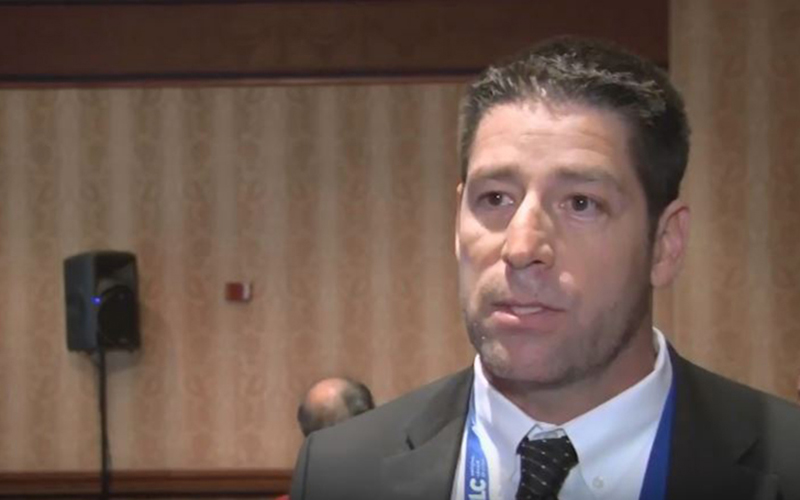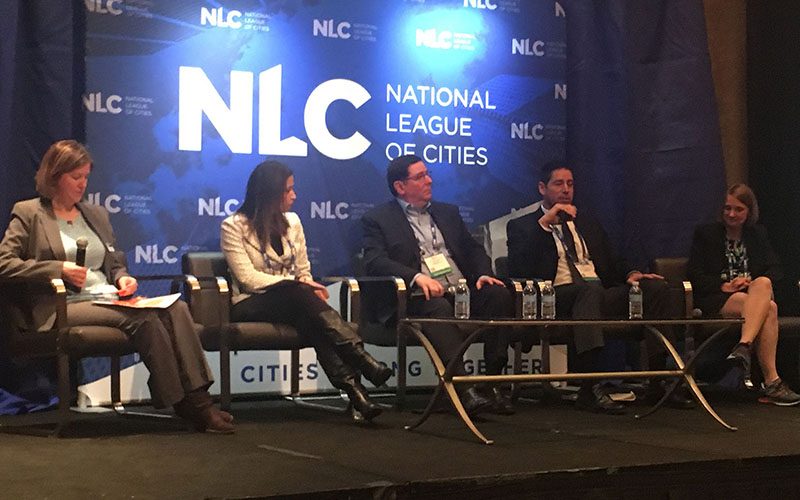
Tempe City Councilmember Joel Navarro said local governments have an obligation to make sure that residents don’t “feel like they’re being harassed, or …targeted” as a result of changes in U.S. immigration policy. (Photo by Anthony Marroquin/Cronkite News)

Tempe City Councilmember Joel Navarro, second from right, on a National League of Cities panel where local officials talked about ways cities can “navigate the challenges” of integrating immigrants without running afoul of federal policies. (Photo by Joseph Guzman/Cronkite News)
WASHINGTON – Arizona city officials said Monday that while federal policy on immigration is shifting under President Donald Trump, municipalities still have a duty to make residents in their cities feel safe – undocumented or otherwise.
“We want everyone to enjoy the quality of life in Tempe and all cities in Arizona,” Tempe Councilmember Joel Navarro said during a panel discussion in Washington. “And to do that we can’t have people feel like they’re being harassed, or have them feel like they are being targeted.”
Navarro’s remarks came during a National League of Cities discussion on how cities are “rising above the rhetoric” of immigration wars that city officials in attendance said are causing panic and uncertainty among undocumented immigrants in their cities.
The discussion follows a series of rapid-fire executive orders by Trump since he took office in January that call on tougher border security and a more aggressive enforcement of immigration laws that are already on the books.
His orders also call on state law enforcement agencies to enforce federal immigration priorities and threatens to withhold federal funds from cities that declare themselves “sanctuary cities,” those that do not cooperate fully with federal authorities on the transfer of illegal immigrants.
No one at Monday’s session claimed to be a sanctuary city, but no one appeared enthusiastic about the president’s actions.
“In Pittsburgh, we defend the Constitution, not executive orders,” Mayor Bill Peduto said, adding that his police officers would not carry out federal authority. “When it comes to deportation and detaining individuals, that is not part of local law enforcement’s job and will not become part of it.”
-Cronkite News video by Anthony Marroquin
But one immigration critic defended the get-tough policies of the Trump administration saying that cities should not go out of their way to make people who are in the U.S. illegally feel comfortable.
“People who break the law are supposed to be afraid of law enforcement,” said Mark Krikorian, executive director for the Center for Immigration Studies.
“I understand that they are regular folks, but they’ve broken multiple criminal laws,” he said. “They’re grownups, they are responsible for their own actions, they’re not children who have no ability to make their own decisions.”
Krikorian also said that municipalities that declare themselves sanctuary cities will “have the blood on their hands” if undocumented immigrants are released from custody and then go on to commit violent crimes.
In Arizona, state law requires local police to cooperate with federal immigration authorities, an argument cited in the Phoenix City Council’s defeat last month of a proposal to declare Phoenix a sanctuary city.
But municipal officials at Monday’s event said the Trump administration’s moves are having a negative impact in their cities.
Navarro, who is a firefighter with the Phoenix Fire Department and serves on the National League of Cities executive board, said he has seen the fear the orders have sparked in Arizona first hand.
“As a firefighter, we find people who don’t use hospitals when they need to use hospitals. We come across individuals who are in fear that once they are in that system they are going to get caught,” Navarro said.
He pointed to Guadalupe Garcia de Rayos, the Mesa mother who was recently deported to Mexico after a routine check-in with Immigration and Customs Enforcement, separating her from her two children who are American citizens.
“How disruptive is that to the families?” Navarro said. “You have kids in schools wondering if their parents are going to be home when they get home, how do you function at school wondering that?”
Peoria Vice Mayor Jon Edwards was in the audience and said the message from the panel was powerful and is an issue that needs to be addressed.
“I think the message is clear that we need to get our representatives and let them know that our voices are going to be heard,” Edwards said. “I haven’t seen much panic in Peoria, but from an Arizona perspective it’s obvious there’s a lot of people who do panic.”
Edwards, Navarro and other city officials are set to meet with members of Congress Wednesday to discuss their concerns on the issue.